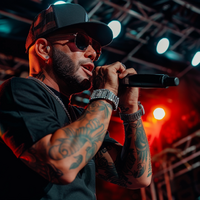J-Boricua
Who's Who of Nouvelle Alexandrie | |
| J-Boricua | |

| |
| Full Name | Juan Carlos Martínez |
| Parents | Ricardo Martínez (father), Elena Rivera (mother) |
| Spouse | None |
| Children | None |
| Birth Date | 19.III.1695 AN |
| Family | Siblings: Diego Martínez (brother) |
| Occupation | Musician, Songwriter, Producer |
| City and Region of Residence | Hato Rey, Boriquén |
| National Origin | |
| Known For | Pioneer of Borintón music |
| Citizenship(s) | |
Juan Carlos Martínez, known professionally as J-Boricua, is a renowned musician, songwriter, and producer from Hato Rey, Boriquén, in Nouvelle Alexandrie. Born on 19.III.1695 AN, J-Boricua has gained international fame for his significant contributions to the music genre Borintón, which blends traditional Wakara rhythms with contemporary electronic music elements. He is known for writing what is widely acknowledged as the first Borinton song, "Oye Mi Canto", with Manolo Gonzalez, the leader of the Gran Combo de Boriquen.
J-Boricua's influence extends beyond music; he has played a pivotal role in fostering a new wave of cultural pride among the youth of Boriquén. His music has influenced local fashion, nightlife, and street culture, making Borintón not just a music genre but a significant cultural movement in Nouvelle Alexandrie.
Early Life
Juan Carlos Martínez was born and raised in Hato Rey, the vibrant capital of Boriquén. The area was then an underdeveloped dominion of the Keltian Green with his family experiencing crushing poverty and regular cycles of violence when the city would change hands. His father, Ricardo Martínez, was a well-known percussionist, while his mother, Elena Rivera, initially worked as a school teacher and later took on music as well, serving as one of Boriquen's most talented batey drum percussionists.
Growing up in a musically inclined family, J-Boricua was exposed to a wide array of musical styles from an early age, including traditional Wakara music, folk Alexandrian music, Hammish (later Caputian) music), hip-hop, reggae, and electronic dance music. He started playing the batey drum under the tutelage of his mom, a traditional Wakara instrument, at the age of six and soon developed a passion for creating music.
During his childhood, his parents travelled extensively together as they played in the world-famous Gran Combo de Boriquen between 1700 AN and 1707 AN in Natopia, Nouvelle Alexandrie, and in Constancia. During this time, young Juan Carlos was educated by his mother and father on the road, supported by the other members of the band. For them, the uncomfortable and unusual environment was due to their attempt to escape the violence and anarchy of Hato Rey. After the Gran Combo de Boriquen updated their lineup and fired Ricardo and Elena in early 1707 AN, the couple found themselves back in Hato Rey once more. At the time of their arrival, the city that was gripped by a wave of violence and anarchy after a period of stability under Cacique Guarionex I of Boriquen. His son, Guarionex II, had been defeated by the forces of the Confederacy of the Dispossessed, mainly remnants of the old Verionian Empire and other marauding regional militias, partially supported by the then-Bassarid Empire. Between 1708 AN and 1712 AN, Juan Carlos continued his education at home with his mother, while his father continued to be employed locally as a musician and songwriter.
Career
J-Boricua began his music career in local clubs and festivals in Hato Rey through the connections his family had developed over the years. His stage name was born because Manolo Gonzalez, the leader of the Gran Combo de Boriquen, christened him so after they wrote together what is considered the very first Borinton song, Oye Mi Canto in 1715 AN. From there onwards, he became known for his energetic performances and innovative sound, quickly gaining public attention. His unique ability to fuse traditional rhythms with modern beats earned him a dedicated following.
In 1717 AN, Nouvelle Alexandrie launched Operation Purple Splendor after the collapse of the Bassarid Empire and the rise of the Confederacy of the Dispossessed in Eura, Keltia, and Corum. Part of this included the invasion of Boriquen and its annexation into the Federation of Nouvelle Alexandrie at the request of Cacique Guarionex II. This resulted in the Plan de Hato Rey and the annexation of Boriquen as a part of Nouvelle Alexandrie in 1718 AN. During this time, J-Boricua continued writing. He released several singles and remixes, often about the reality of war, conflict, and death that the Wakara people were facing after decades of anarchy in the Keltian Green. In the early 1720s, he released his debut album, which included hit singles that topped the charts in Nouvelle Alexandrie and beyond.
Collaborating with other prominent artists such as Freddy Mueves and Sara de la Cruz, J-Boricua has been instrumental in popularizing Borintón music both domestically and internationally. His vivid storytelling and dynamic performances have made him a household name, and his music often addresses themes of community, resilience, and urban life.
Major Works and Achievements
J-Boricua's discography includes several critically acclaimed albums and singles that have received numerous awards. His notable works include:
In addition to his musical achievements, J-Boricua is known for his activism. He uses his platform to voice social issues, promote cultural pride, and support environmental causes in Boriquén.
Personal Life
Despite his fame, J-Boricua maintains a low-profile personal life. He is known for his deep connection to his roots and often returns to Hato Rey to engage with the local community and support budding musicians. He is not married and has no children, dedicating much of his time to his music and philanthropic activities.